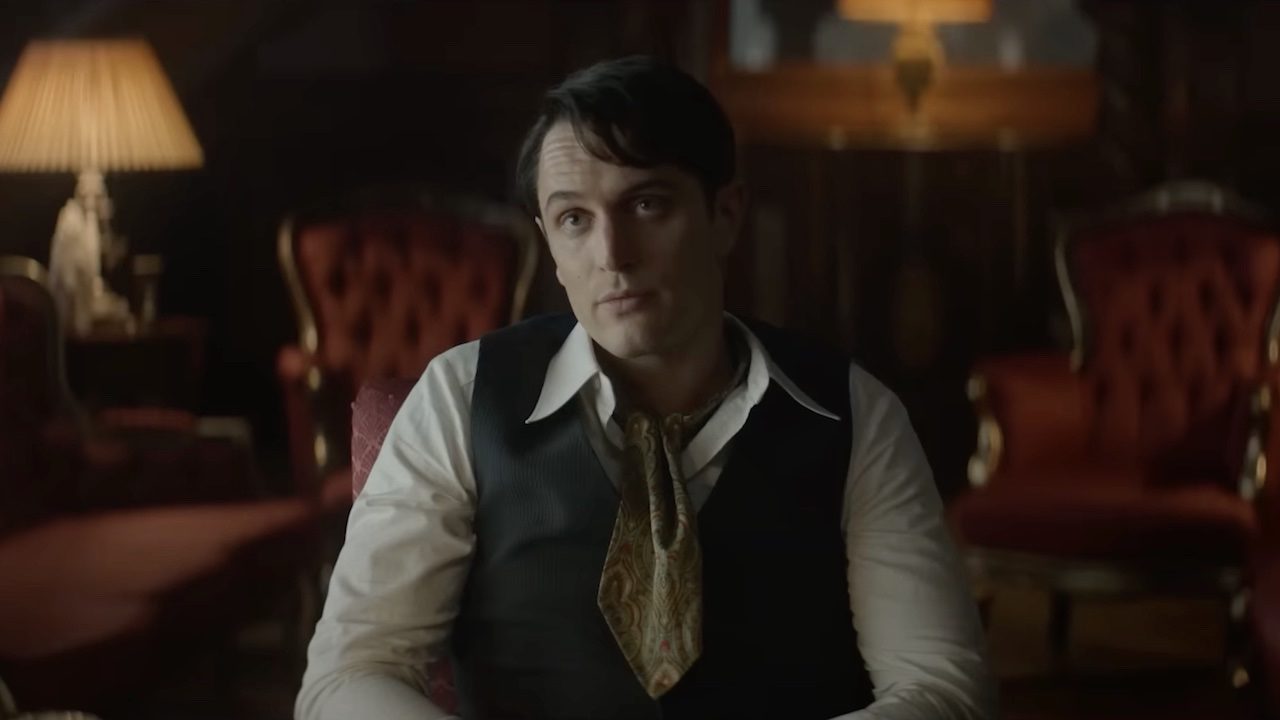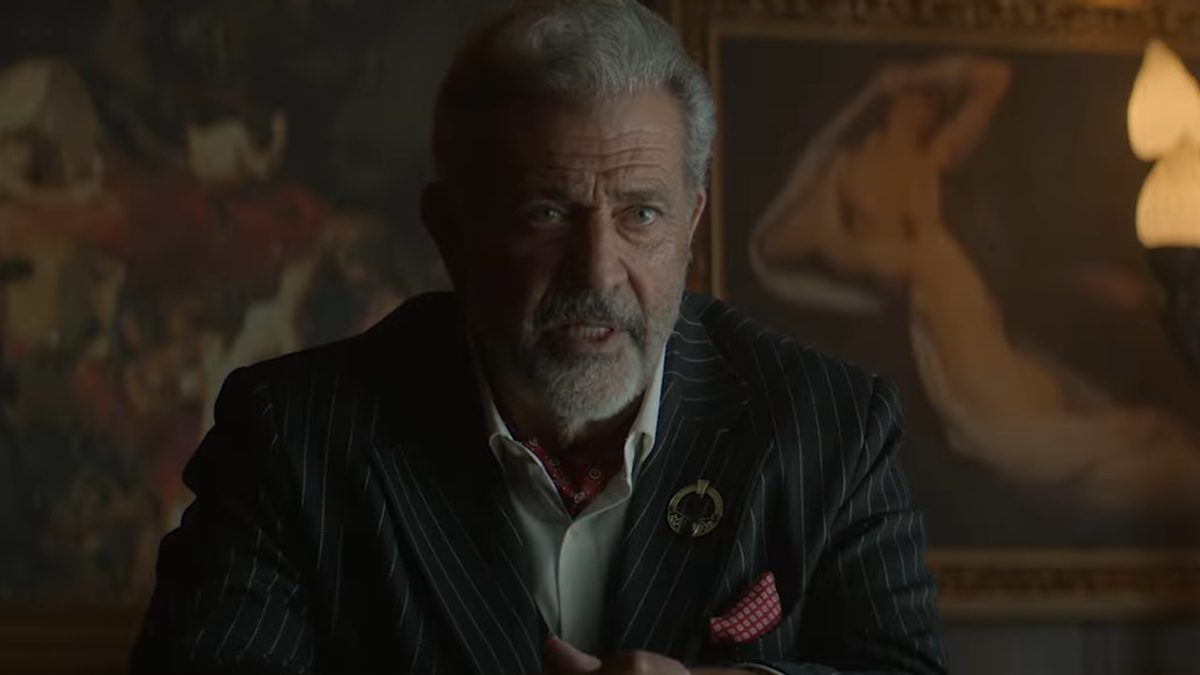REVIEW: The Continental – Episode 1, “Brothers in Arms”
The Continental is a nice surprise. The first episode, “Brothers in Arms,” is much better than I thought it would be, an entertaining trip back to the crime-ridden New York of the 70s in the John Wick universe. It’s got style to spare and some excellent filmmaking from Albert Hughes, formerly of the Hughes Brothers. Its biggest fault is that it centers on its least interesting character.
Winston Scott (Colin Woodell), a real estate magnate pushing parking structures to the European aristocracy, is brought to New York by Cormac (Mel Gibson), the current owner of The Continental, the hotel from which the High Table’s assassins operate. Winston’s older brother, Frankie (Ben Robson), stole something from the hotel’s vault, and Cormac wants it, along with Frankie’s head. Now, Winston must navigate the criminal underworld he once escaped to save the brother who saved him long ago.
The idea of a John Wick prequel never sat well with me, as prequels in general rarely do. Part of the allure of those movies is the mystery surrounding the High Table and their world, with various rules and elements revealed as needed throughout Wick’s story. The Continental added to the prequel pitfalls by focusing on Winston, a character who, like the organization for which he works, is fascinating largely because little is known outside of what we see in Ian McShane’s excellent performance. And that’s the worst part of The Continental; we learn much about Winston’s life before he took control of the hotel, going as far back as his childhood. And as a young man, now embodied by Colin Woodell, he is strikingly different from the ruthless figure of the films. He’s not imposing or sinister, he can’t fight, and he has no idea how to navigate the High Table’s world. He’s confident in his business dealings, but not when faced with hit men or thieves. This is a bit of a catch-22; it’s necessary to have Winston grow in the series, to become Winston as we know him. But the Winston of the past is not terribly interesting; he’s just kind of… there. Colin Woodell is fine, but it’s not much fun following him, knowing that he’s not going to do anything cool like John Wick would because he can’t.
That’s compounded by one of The Continental’s strengths: the rest of the characters are much more compelling than Winston. His brother Frankie is an experienced criminal, one who has skills closer to Wick and his fellow killers, and when he runs afoul of the High Table, you wish he was the focus of the story. Then, Miles and Lou (Hubert Point-Du Jour and Jessica Allain), a brother-sister arms-dealing team, arrive, making money the only way they can in tough economic times to keep their dad’s failing karate dojo afloat. There’s a good story here, too, and the siblings are interesting when they’re around, with love and conflict intermingling in their relationship. But they’re side characters. Another subplot involves KD and Mayhew (Mishel Prada and Jeremy Bobb), a pair of adulterous detectives who stumble onto The Continental during an investigation. KD seems to know that the hotel has a reputation, but not the extent of the High Table’s power, while Mayhew understands the trouble that awaits anyone who crosses them. All of these characters are fun and well-rounded, and it’s a drag when they go away in favor of Winston. The irony is that, in the movies, Winston is one of them, a neat supporting character who adds flavor to this universe. Making him the lead was a mistake.

But aside from Winston, The Continental is entertaining. There isn’t a lot of action in “Brothers in Arms,” but when it happens, it’s very much in the style of the movies, with long takes taking us on a ride with the combatants. The exception is a car chase late in the episode, which keeps cutting to black before showing us clips of the shooting and crashing. It’s an odd choice, and one that I suspect was made for budgetary reasons, and it’s disappointing compared to the rest of it. But the fights and shootouts are as fun and kinetic as you’d expect, if not exactly on the same level as a John Wick movie. I also love the design of the series; 1970s New York is painstakingly recreated, and every detail feels right. (Well, as much as someone who wasn’t alive at the time can say for sure, anyway; it feels right.) The cars and clothes, even down to the sunglasses, are right at home in that era, and the streets are grimy and full of garbage, partly to visualize the effects of the sanitation strike. This is a different New York than the one in the movies (and one the city is quickly returning to in real life), and it adds significantly to the flavor of the show.
But the best part of The Continental is what was the biggest draw for me: Mel Gibson. He’s the main villain, Cormac, and he’s having a great time. He knows when to growl at his underlings and when to calmly make a devastating point and get what he wants from those who fear him. He’s respectful of the rules he knows he must obey, but he’s irreverent when he can get away with it, dismissively making clear that everyone around him is beneath him. But at other times, he looks like the life of the lavish, Studio 64-esque parties he throws, running The Continental as a Hollywood mover and shaker. He’s essentially both sides of Harvey Weinstein (at least, the image Weinstein carved out for himself before the truth came out): the friend in public and the shark behind closed doors. It’s great, and Gibson is fun in the role. I also like the twin assassins introduced later on, whom Gibson flippantly calls “Hansel and Gretel;” they’re the kind of heavies you could see going up against Wick and giving him a real challenge.

So, color me surprised; I like The Continental so far, even if I don’t love it yet. Winston is a problem, which is unfortunate because he’s the lead, but if “Brothers in Arms” is any indication, it’s an entertaining crime series that may just avoid ruining the John Wick mystique.
The Continental – "Brothers in Arms"
Plot - 8
Acting - 8
Progression - 8
Production Design - 9
Action - 8
8.2
Good
“Brothers in Arms” is a fun, compelling introduction to The Continental, with the major drawback being, unfortunately, its lead character.







